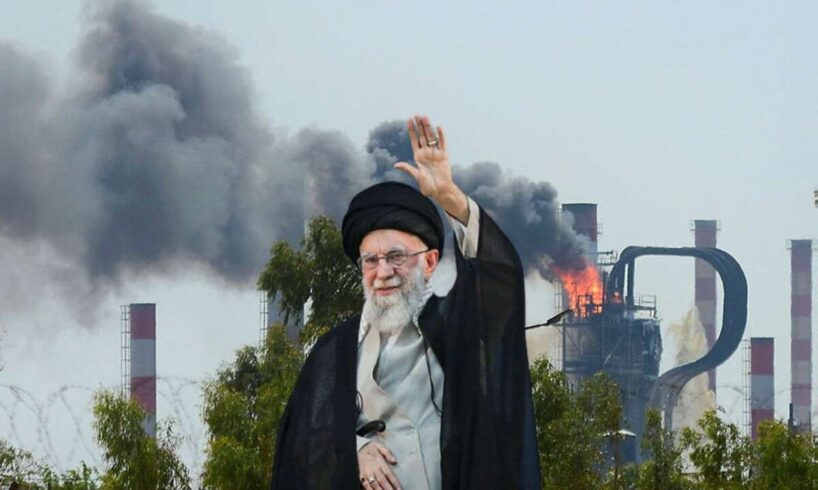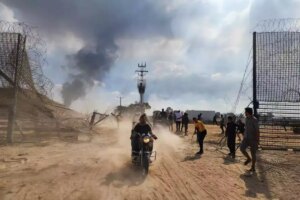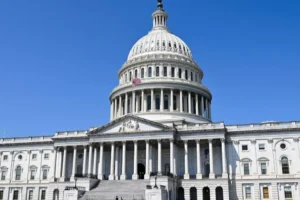
Iranian authorities are privately investigating what they believe to be a systematic sabotage campaign following more than two weeks of mysterious explosions and fires across the country, according to The New York Times. Three Iranian officials, including a member of the Islamic Revolutionary Guards Corps, told the publication they suspect many of the incidents are deliberate acts of sabotage rather than coincidental infrastructure failures.
The wave of explosions and fires has targeted diverse locations including apartment complexes, oil refineries, roads near major airports, and even a shoe factory. While Iranian officials have publicly attributed the incidents to aging infrastructure, gas leaks, and coincidental malfunctions, they privately suspect a coordinated campaign designed to create instability, The New York Times reported.
Iranian authorities have focused their suspicions on Israel, citing its extensive history of covert operations within Iran, including previous explosions and assassinations. A European official who deals with Iran independently assessed the attacks as sabotage and suspected Israeli involvement, according to The New York Times. The officials spoke anonymously because they were not authorized to discuss the matter publicly.
A missile is launched during an Iranian Army exercise dubbed ‘Zulfiqar 1400’, in the coastal area of the Gulf of Oman, Iran, in this picture obtained on November 7, 2021 (Iranian Army/WANA /Reuters / West Asia News Agency)
A senior Israeli intelligence official had vowed to continue operating in Iran following Israel’s 12-day bombing campaign against the country last month. The incidents have occurred at a rate of one to two explosions per day across Iran, creating what officials describe as widespread anxiety among both government personnel and the general population.
Among the most significant incidents was a fire at a major oil-producing refinery in the southern city of Abadan on Saturday that killed one person, injured several others, and disabled a production line. Other explosions have struck residential buildings with such force that they sent massive plumes of smoke into the air while collapsing walls and ceilings.
Iranian officials have not provided evidence to support their sabotage suspicions, and authorities who spoke publicly continued to cite alternative explanations including gas leaks, garbage fires, and deteriorating infrastructure. However, they have also failed to provide convincing explanations for why gas explosions are occurring at such an unprecedented rate across the country, The New York Times noted.
The Iranian authorities remain hesitant to publicly declare their suspicions about potential Israeli involvement because they fear being cornered into having to retaliate against Israel. Iran’s air defense systems, missile launchers, military bases, and nuclear facilities sustained significant damage during last month’s conflict, leaving the country’s military capabilities weakened.
Although Iran maintained its ability to launch ballistic missiles into Israel until the final hours before a ceasefire ended the conflict, officials worry that restarting hostilities could further compromise Iran’s military strength. This strategic vulnerability has influenced Iran’s decision to maintain public silence about potential Israeli involvement while privately investigating the incidents.
Some explosions have targeted strategically sensitive locations beyond basic infrastructure. One blast occurred at a high-rise compound in Tehran that provides discounted housing to judiciary employees, blowing out walls and windows. The three Iranian officials told The New York Times they believe saboteurs might have deliberately targeted the location to create panic among judges and prosecutors, similar to Israel’s previous campaign of assassinating nuclear scientists.
In another case in Qom, an apartment building explosion was so powerful it resembled the aftermath of a bomb blast, with first-floor walls brought down and windows shattered. A yellow taxi parked on the street was crushed under rubble, and the blast injured seven people while covering the entire surrounding block in debris, according to videos published on social media and BBC Persian.
The unit that exploded appeared to have been rented by operatives who left the building after turning on stove and oven gas, seemingly to deliberately spark a blaze, two Iranian officials told The New York Times. This pattern suggests a level of planning and coordination that contradicts official explanations of accidental gas leaks.
For over a decade before the recent war, Israel and Iran conducted their battles primarily through covert operations spanning air, land, sea, and cyberspace. Israel has repeatedly carried out clandestine operations in Iran, including explosions and drone strikes targeting nuclear facilities and military figures. Iran has responded by attacking Israeli-owned ships in the Persian Gulf, launching missiles at Israel-linked structures in Iraq, and funding armed groups like Hamas in Gaza.
A billboard depicting Iran’s Supreme Leader Ayatollah Ali Khamenei is displayed in the centre of Tehran’s Valiasr Square on July 13, 2025 (ATTA KENARE / AFP)
Publicly, Iranian officials have attempted to explain away the fires through various means. In cases such as the blaze near Mashhad International Airport in northeast Iran, officials claimed they were conducting “controlled burning of weeds,” while attributing a Tehran fire to garbage burning. For most blazes, however, Iranian officials have blamed gas leaks caused by what the director of Tehran’s fire and public safety departments, Ghodratollah Mohammadi, described to state media as “worn-out equipment, the use of substandard gas appliances and disregard for safety principles.”
The Revolutionary Guards member interviewed by The New York Times stated that the cumulative effect of near-daily explosions has created a growing sense of anxiety among both officials and Iranian citizens more broadly, regardless of whether some incidents were genuine accidents. “The Iranian government’s long record of cover-ups and lack of transparency, along with its vague responses, have only deepened public fear and suspicion,” said Omid Memarian, an Iran expert at DAWN, a Washington-based foreign policy research institute. “People are aware the regime often downplays or denies Israeli attacks.”
Without public acknowledgment of what many Iranian residents perceive as coordinated attacks, some citizens have questioned whether the war truly ended. “A lot of us think that it is Israel’s doing and that war is going to start again,” said Mohammed, who runs a cafe and art gallery in Kashan. He requested anonymity over fears of repercussions for speaking to foreign news media, adding that he felt “scared and paranoid,” particularly because Kashan is located near nuclear sites and missile bases.
Mahdi Mohammadi, a conservative politician and senior advisor to Iran’s head of Parliament, described the situation with Israel as unpredictable. “If anyone thinks we are dealing with linear events that we can predict, they are naïve,” Mohammadi said in one of his regular recorded speeches distributed on Telegram. “We are not even in a ceasefire now; we are in a fragile suspension, and any minute it can end, and we are back at war.”
The Soroka Medical Center following the barrage on Thursday, June 19, 2025 (AP)
Many Iranians have also questioned the circumstances surrounding the death last week of Brig. Gen. Gholamhossein Gheybparvar, a deputy commander of the Revolutionary Guards who oversaw a Tehran military base responsible for crackdowns on women-led protests in 2021. According to a state media announcement, he died from complications related to chemical weapons injuries sustained during Iran’s 1980s war with Iraq, which had flared up amid stress from the recent conflict with Israel.
Israeli security forces and first responders gather at the site of an Iranian strike that hit a residential neighborhood in the Ramat Aviv area in Tel Aviv on June 22, 2025 (Jack GUEZ / AFP)
Officials have attempted various approaches to address public anxieties about the ongoing incidents. The national gas company released statistics arguing there was no notable increase in explosions from gas leaks this year compared to last year’s figures. The Tehran City Council invited the gas company and ministry of energy to present reports regarding “recent measures and developments,” describing the discussion as addressing the situation under “normal circumstances.”
To cope with mounting stress, many Iranians have turned to dark humor on social media, sharing photoshopped images of Israeli Prime Minister Benjamin Netanyahu wearing the uniform of Iran’s national gas company.





